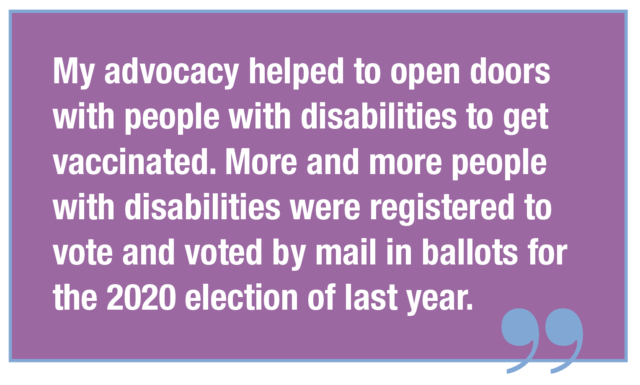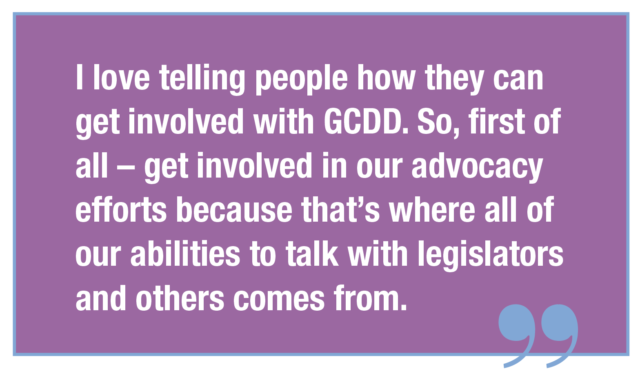Featuring Nandi Isaac, Self-Advocate & GCDD Council Member
Nandi Isaac, self-advocate and GCDD council member; and Eric Jacobson, executive director of GCDD sat down for a virtual interview on what advocacy means and how it helped the disability community during the COVID-19 pandemic.
Eric Jacobson (EJ): Earlier this month, alongside a strong network of advocates, we were successful in expanding vaccine access to people with intellectual and developmental disabilities (I/DD) across the state of Georgia. Today, I’m joined by GCDD council member and self-advocate extraordinaire Nandi Isaac for a brief conversation on effective advocacy during Developmental Disability Awareness Month and beyond. This is an important time for health care access and advocacy and we are looking forward to chatting about that today.

Nandi Isaac (NI): Thank you Eric, I am so excited to be here today, thanks for the opportunity to share. I advocated for the vaccine with Governor [Brian] Kemp by contacting him online. Governor Kemp added people with learning disabilities to the vaccine March 8th. I train my peers for advocacy, to rise up and speak up. We spoke to many groups on voting rights and why it is so important to vote. I created nine videos for Georgia on our valued social roles, supportive decision-making and stereotypes.
EJ: How do you feel your advocacy has worked to improve the lives of Georgians with developmental disabilities?
NI: My advocacy helped to open doors for people with disabilities to get vaccinated. More and more people with disabilities were registered to vote and voted by mail in ballots for the 2020 election of last year.
EJ: Great! We know advocacy can mean lots of things, so what are some simple ways that a person can advocate for themselves in their local community just to get started?
NI: One, knowing your rights and responsibilities. Two, learning how to get information on goals, standing up for your rights, signing up to support yourself, reaching out when you need support. Speaking up or writing to support yourself.
EJ: So, what should people know about becoming an advocate for things that matter to them?
NI: It matters a lot! It is very important to get all the waivers and services and supports that we need.
EJ: Well, thanks for answering those questions, Nandi!
NI: You’re welcome, Eric. And, now are you ready to be interviewed, Mr. Eric?
EJ: I am.
NI: Let’s get started then! Okay, agencies work in many different ways to support their visions. How does GCDD support advocates and their efforts?
EJ: Councils across the country are required by the Developmental Disabilities Bill of Rights and Assistance Act, to fund self-advocacy efforts in at least a couple of different ways. First, we are supposed to fund an organization that provides self-advocacy efforts, so United for Change, which is offered by Sangha Unity Network (SUN) is one of those projects that we started funding to help promote self-advocacy across the state. We are also supposed to support leadership efforts for people with I/DD and then finally for cross-disability coalitions. So when we’re working on things like addressing the waivers, we’re working with people not only with developmental disabilities, but people with physical disabilities and other disabilities as a way of trying to make sure that everybody gets the services that they need. We are really involved externally in trying to help people, but also to make sure that self-advocates on the council have an opportunity to take on leadership roles and to expand their own leadership opportunities. So we think we are very involved in supporting self-advocacy and those efforts.
NI: Thank you, Eric. It’s something that I learned on the council. Second question, what do people not know about GCDD and how it works to address people with I/DD?
EJ: I think one of the most important things to think about, especially around advocacy efforts, is that the Georgia Council on Developmental Disabilities really only has 25 or 26 members at a time and that means that those are the only people we truly represent. So the power of GCDD comes from advocates across the state pushing issues that are important, then the council comes behind that effort to talk with legislators and others to push issues that are important to all people.
NI: Okay, last question. Eric, can you please tell us how people can get involved with GCDD?

EJ: I love telling people how they can get involved with GCDD. So, first of all as I just kind of mentioned – get involved in our advocacy efforts because that’s where all of our abilities to talk with legislators and others comes from. So join our advocacy network. You can go to our website, click the green button at the bottom to join our network of grassroots advocates. You can subscribe to our magazine and our newsletter. Visit our online magazine to read stories about issues important to people with disabilities and their families. And finally you can get support and answers to your questions by joining the Georgia DD Network’s monthly Zoom session on COVID-19 in Georgia and supporting people with I/DD.
Really, the idea is to get involved, to make sure that you have opportunities. Without, for instance, our advocacy efforts, I don’t think people with intellectual and developmental disabilities would have gotten their COVID vaccine shots as quickly as they did. So advocacy is a really important part. Thanks for asking me that question, Nandi.
NI: You’re welcome.
EJ: And thanks for listening today to this blog!
NI: I also got my very first vaccine a couple of weeks ago and I get my last one on the 31st of [March].
EJ: Before we go, can you share a self-advocacy experience that was very momentous for you, where you realized that your efforts were paying off on an issue that was important to you?
NI: Last year, things got a little bit hectic and so it hit really, really strong with COVID. I really didn’t like the fact of being away from my community that much because I love Special Olympics. I miss my friends and it’s really hard for me to get around this pandemic thing. But I’m still holding on tight by staying busy by advocating. I have written letters to Governor Kemp; he replied to that letter and he went ahead and applied that on March 8th. It is like a miracle, it’s really astounding. like a blessing. I got my very first vaccine a couple weeks ago and I’m going to get my last one following this week. And I think this story will not only change my life but other people’s with disabilities like I have as well. Advocates have various disabilities, so I helped them and encouraged them to get vaccines so that they can be vaccinated and be a part of the community, and do things on their own or with the help of a caregiver or a family member. That’s why I advocated to help people with disabilities get this COVID-19 pandemic shot.
I know that all of you are very busy and I want to say thank you to all of you. This has been a whirlwind of heartache one after another after another, but we go through this together and that’s why we are writing, speaking up, not just for our world but for our families and our loved ones and friends. After the pandemic is finished, there’s going to be a new normal. I don’t know how I’ll feel after that, but it is going to be really hard. But, prayer is very powerful in my family and I think prayer is the key to getting this COVID to go away.
EJ: I think I would just add that really over the last year we have heard lots of stories from individuals with developmental disabilities who felt isolated. I know that they are excited for the opportunity to return to somewhat of a normal life where they can see their friends and family and meet with them. I think the most important thing that we can do is add is what we’ve learned from self-advocates. We as an organization and we as individuals. And really this trend or important part of making sure that self-advocates are in leadership positions on DD councils and other organizations is really how we are going to change what’s happening in our society. So I just want to encourage people to extend those opportunities for leadership to people with intellectual and developmental disabilities. As we do that with the Georgia council, I think we are going to see more and more people step up and their message is going to be heard much better by legislators and other policymakers when it comes from them. So I want to thank you again, Nandi for doing this with us, to tell your story because we need to hear more stories like Nandi’s.
NI: Thank you Eric, thank all of you.
[aiovg_video id=2908]
